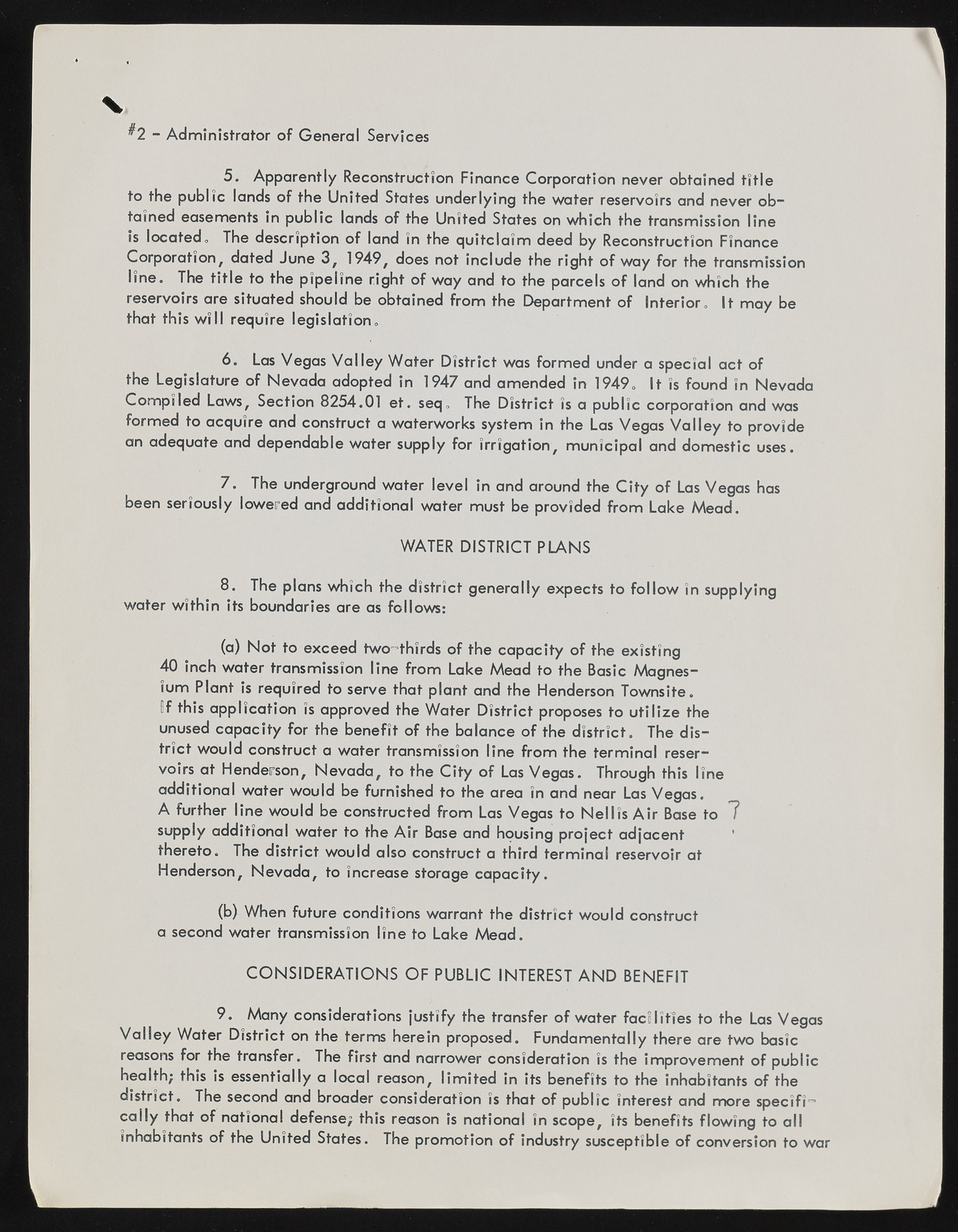Copyright & Fair-use Agreement
UNLV Special Collections provides copies of materials to facilitate private study, scholarship, or research. Material not in the public domain may be used according to fair use of copyrighted materials as defined by copyright law. Please cite us.
Please note that UNLV may not own the copyright to these materials and cannot provide permission to publish or distribute materials when UNLV is not the copyright holder. The user is solely responsible for determining the copyright status of materials and obtaining permission to use material from the copyright holder and for determining whether any permissions relating to any other rights are necessary for the intended use, and for obtaining all required permissions beyond that allowed by fair use.
Read more about our reproduction and use policy.
I agree.Information
Digital ID
Permalink
Details
More Info
Rights
Digital Provenance
Publisher
Transcription
5. Apparently Reconstruction Finance Corporation never obtained title to the public lands of the United States underlying the water reservoirs and never ob-tained easements in public lands of the United States on which the transmission line is located. The description of land in the quitclaim deed by Reconstruction Finance Corporation, dated June 3, 1949, does not include the right of way for the transmission line. The title to the pipeline right of way and to the parcels of land on which the reservoirs are situated should be obtained from the Department of Interior. It may be that this will require legislation. 6. Las Vegas Valley Water District was formed under a special act of the Legislature of Nevada adopted in 1947 and amended in 1949. It is found in Nevada Compiled Laws, Section 8254.01 et. seq. The District is a public corporation and was formed to acquire and construct a waterworks system in the Las Vegas Valley to provide an adequate and dependable water supply for irrigation, municipal and domestic uses. 7. The underground water level in and around the City of Las Vegas has been seriously lowered and additional water must be provided from Lake Mead. WATER DISTRICT PLANS 8. The plans which the district generally expects to follow in supplying water within its boundaries are as follows: (a) Not to exceed two-thirds of the capacity of the existing 40 inch water transmission line from Lake Mead to the Basic Magnesium Plant is required to serve that plant and the Henderson Townsite. if this application is approved the Water District proposes to utilize the unused capacity for the benefit of the balance of the district. The district would construct a water transmission line from the terminal reservoirs at Henderson, Nevada, to the City of Las Vegas. Through this line additional water would be furnished to the area in and near Las Vegas. A further line would be constructed from Las Vegas to Nellis A ir Base to 7 supply additional water to the Air Base and housing project adjacent thereto. The district would also construct a third terminal reservoir at Henderson, Nevada, to increase storage capacity. (b) When future conditions warrant the district would construct a second water transmission line to Lake Mead. C O N SID E R A T IO N S O F PUBLIC INTEREST A N D BENEFIT 9. Many considerations justify the transfer of water facilities to the Las Vegas Valley Water District on the terms herein proposed. Fundamentally there are two basic reasons for the transfer. The first and narrower consideration is the improvement of public health; this is essentially a local reason, limited in its benefits to the inhabitants of the district. The second and broader consideration is that of public interest and more specifically that of national defense; this reason is national in scope, its benefits flowing to all inhabitants of the United States. The promotion of industry susceptible of conversion to war *2 - Administrator of General Services

